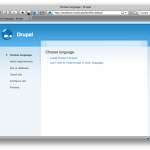The Creative Class
Dwelve 2005: A Participatory, Online Journey by Evelyn Rodriguez at Crossroads Dispatches offers an invitation to participate in an online experiment being conducted over the next month. She is starting a journey of the creative process and wants you to join her. "To astound the world, you must sink into creativity as a heroic act."...to come up with your own breakthrough ideas.
"The success of your next product or service (that includes the product You) doesn’t hinge on simply working harder and longer hours." "If you are merely following lock-step with your competitors and peers..."; or if you are finding it increasingly difficult to simply stay in the game, Ms. Rodriguez is offering one solution. I'm jumping in, too; I only wish she was using our tools instead of Typepad for her journey. You know, something more robust.
From a different angle, The Boston Consulting Group article"Leadership in a Time of Creative Destruction" by Carl Stern,. registration is required, offers three ideas on dealing with competitive threats.
"Competitive advantage has become frustratingly elusive: harder to establish than it used to be and harder still to sustain. Strategy has always been about winners and losers. But because competitive advantage has become so elusive, today's winners are in a tougher position than ever before. Carl Stern speculates on why organizations find it so hard to adapt to the pace of change and offers three ways in which leaders can motivate the organization to confront those challenges."
Reasons why change is so hard...
- A surprising number of companies simply misperceive the threat.
- Threats exceed the organizations adaptive capabilities.
- Organizations see the threat, but do not have the stomach to deal with it.
Confronting the challenges -- The creative class.
"The norms that were valued in an earlier generation had to do with concepts like hierarchy and seniority-or, at least, experience and job security. Today's employees aren't as concerned with those issues. They care more about meritocracy, autonomy, self-expression, self-improvement, and mobility. In the past, leaders could rely on a variety of extrinsic motivators; today it's intrinsic motivators-the nature of the job and respect from peers."
What does the new class of employee have to do with meeting adaptive change?
- Your natural leaders are the truth tellers, the outlaws. These are the ones that will help you duck the bullet heading your way.
- Calibrate your radar to separate the noise from the signal.
- You need to enlist the whole organization.
You know, I think Ms. Rodriguez's offer is incredible. Sadly though, the people that need it the most are the ones most likely to blow it off.










